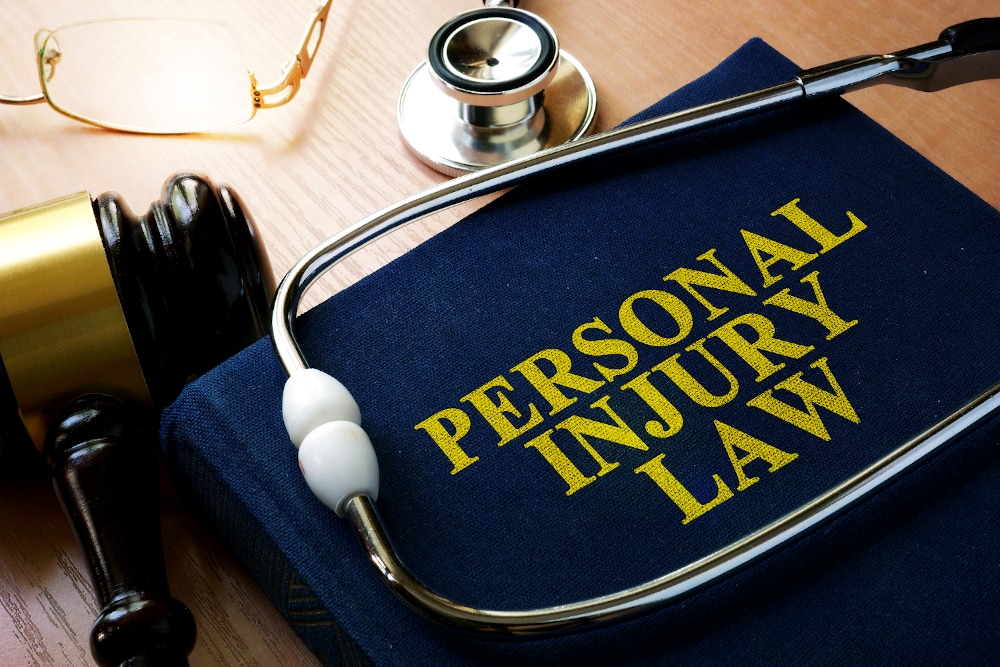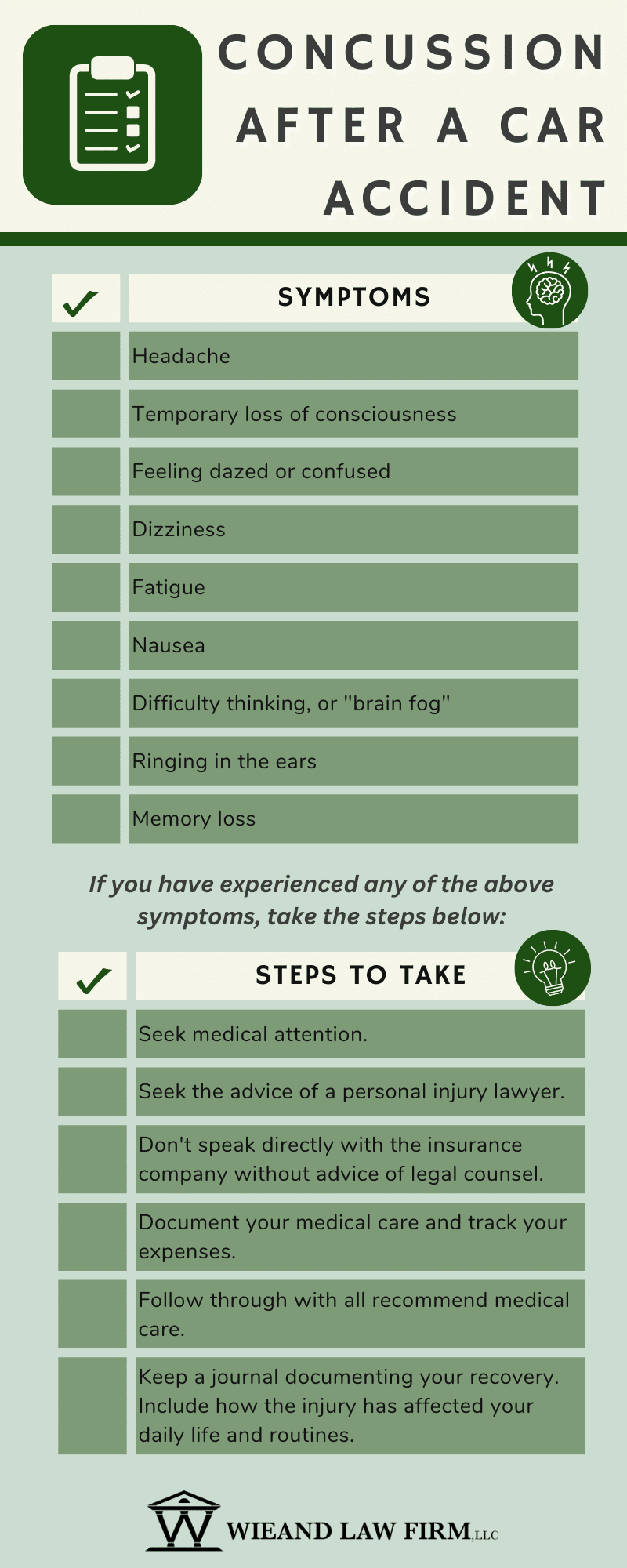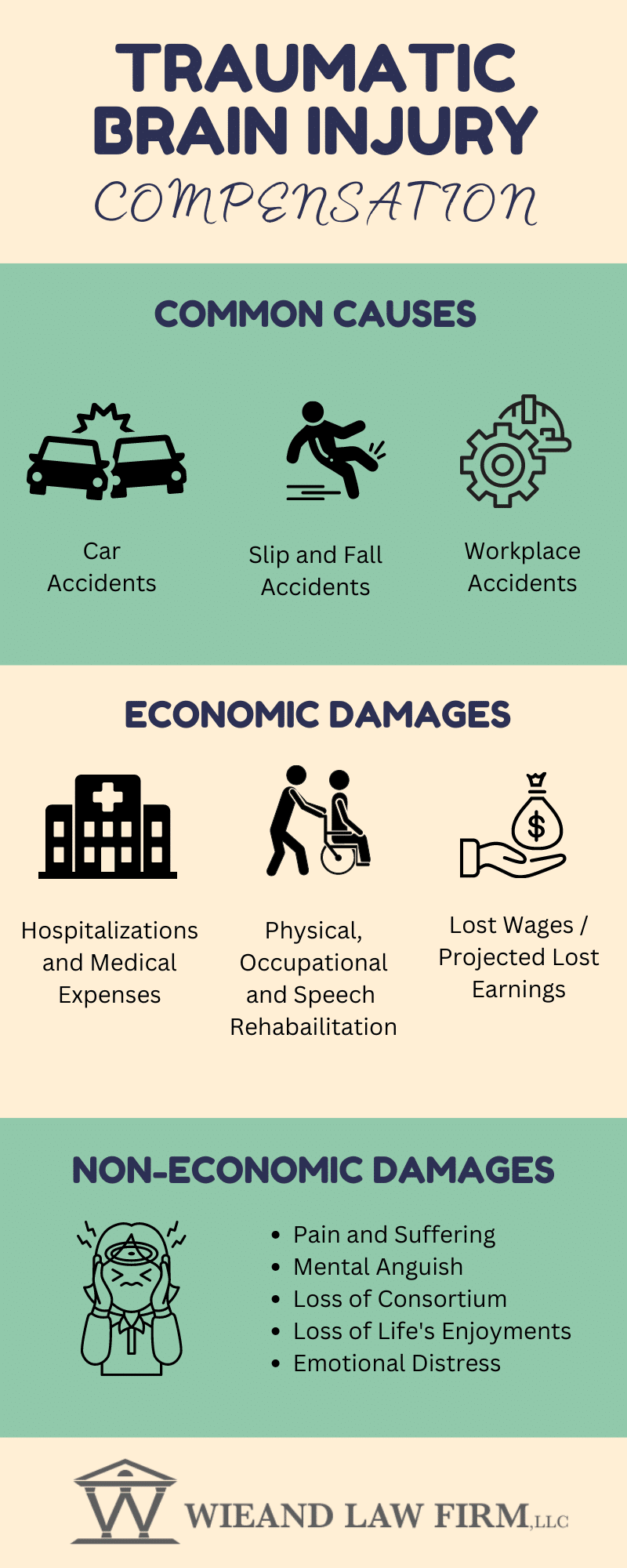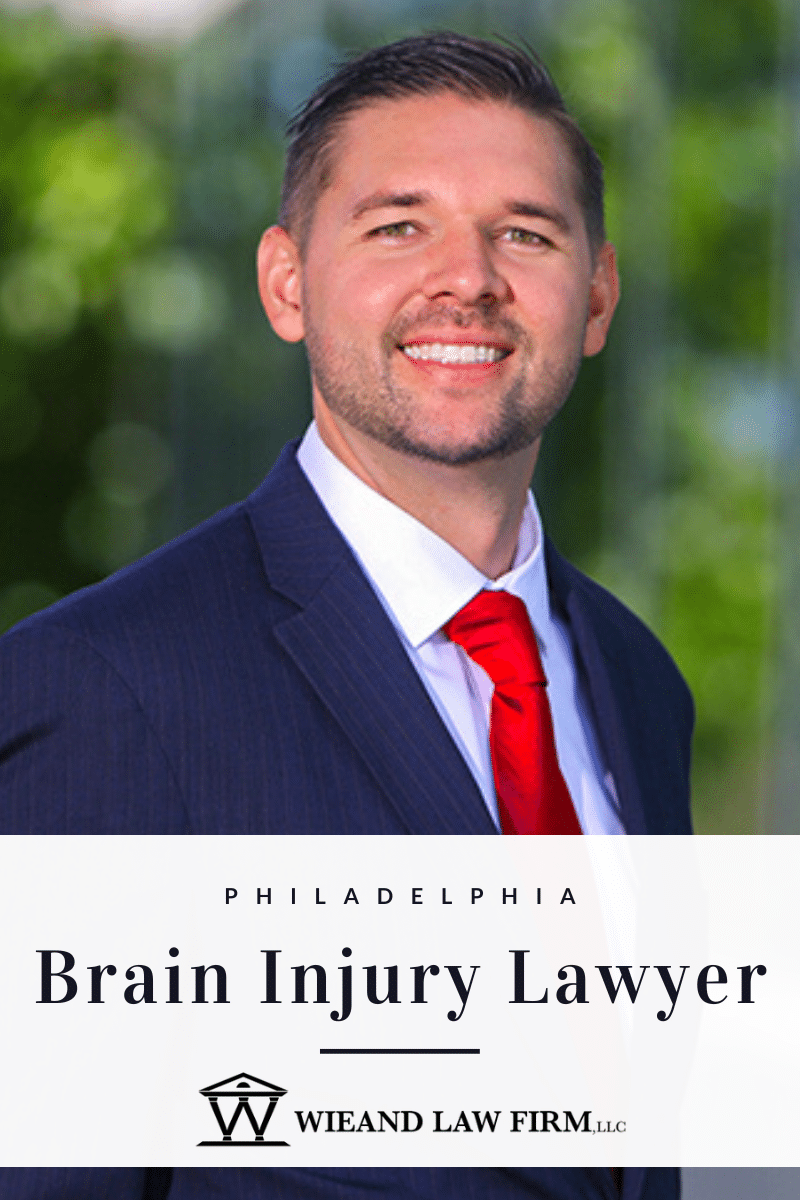 Brent Wieand is an aggressive traumatic brain injury lawyer in Philadelphia with significant experience representing accident victims who have suffered traumatic brain injuries (TBIs). If you or a loved one has suffered a traumatic brain injury in Pennsylvania or New Jersey, you may be entitled to compensation.
Brent Wieand is an aggressive traumatic brain injury lawyer in Philadelphia with significant experience representing accident victims who have suffered traumatic brain injuries (TBIs). If you or a loved one has suffered a traumatic brain injury in Pennsylvania or New Jersey, you may be entitled to compensation.
The Philadelphia traumatic brain injury lawyers at the Wieand Law Firm have the resources necessary to help you pursue justice for your injury. Brain injuries can be devastating to victims and their families. That’s why you need a TBI attorney to fight hard on your behalf.
A traumatic brain injury is caused by a blow or jolt to the head that disrupts the normal function of the brain. According to the Centers for Disease Control and Prevention (CDC), there were over 64,000 TBI-related deaths in the United States. Even more individuals suffer with disabilities caused by head injuries and concussions that impact their ability to enjoy daily life, function, and earn a living.
Brain injures can result in a wide range of symptoms and disabilities. Philadelphia brain injury lawyers understand that two brain injuries are the same. And frequently, the consequence of two similar injuries may have significantly different symptoms.
Situations that Can Result in Traumatic Brain Injuries (TBIs)
The consequences of a TBI can have a significant impact on the victim’s life and their family’s life. Victims may suffer temporary or even permanent impairments and debilitation. Injuries such as anoxic brain injuries can have life-threatening impacts when the brain is deprived of necessary oxygen.
A head injury claim can be very complex. Seeking the advice of a TBI attorney with experience in these types of cases is crucial to getting you the best possible result.
In some cases, certain indicators may appear immediately. Other times, symptoms of a traumatic brain injury may not be present for days or weeks after the incident. The leading causes of traumatic brain injuries are trip/slip and falls, car accidents, incidents where a person is struck by an object on the head, violence and sports injuries.
A traumatic brain injury can be mild, moderate or severe.
Mild traumatic brain injuries will generally involve one or more of the following symptoms:
In cases of a mild brain injury or concussion, permanent changes of memory and concentration can occur, even absent loss of consciousness. A severe head injury happens if there is loss of consciousness of at least 24 hours.
A person with a moderate or severe brain injury may experience severe headaches, vision loss, seizures, movement problems, and problems with their thought processes or memory. Many of these symptoms can persist for an extended period of time. If you or a loved on has suffered a moderate or severe TBI, contact a Philadelphia brain injury lawyer about filing a head injury claim to seek compensation for your injuries.
Proving a head injury claim is important to achieve monetary compensation to for injuries you experienced. To prove your claim, a TBI attorney must be able to show that:
Proving these elements will require evidence. First, you must prove that you suffered an injury. A TBI attorney will work to procure the medical records to support the injury you suffered to back up your claims.
Proving a TBI can sometimes be difficult because symptoms associated with brain injuries may not be visible on a CT scan/MRI, or could also be found in otherwise healthy person. To overcome these obstacles, Philadelphia brain injury lawyers work with top experts such as neurologists and psychiatrists to link the injury to the accident. When a claim involves a diffuse brain injury, a neuropsychologist may be used to prove causation and damages.
A TBI attorney will also work to prove the severity and long-term impacts of your injuries. This will strongly impact the amount that you can receive in compensation. These expenses include hospital bills, rehabilitation treatments, in-home or long term care, as well as anticipated future medical expenses.
 Do I Need a Philadelphia Brain Injury Law Firm?
Do I Need a Philadelphia Brain Injury Law Firm?From expert witnesses to demonstrative evidence, every detail is important when proving a serious head injury claim. A Philadelphia brain injury lawyer at Wieand Law will give you the personalized attention needed to fully understand your unique circumstances and prove your case.
Trust your case to an experienced TBI attorney who is knowledgeable of the science behind brain injuries and the law. If you or a family member has suffered a brain injury and have a legal question call experienced traumatic brain injury lawyer Brent Wieand directly at 1 (215) 666-7777 for a free case evaluation.
Many closed head injuries are caused by slip/trip and fall accidents, sports and automobile accidents. In general, there are six main types of closed head injuries.
Closed head injuries can be focal or diffuse. Focal head injuries, such as a hematoma or intracranial hemorrhage, are confined to one area of the brain. They can be visually verified by a CT scan or MRI.
Diffuse head injuries, like sub concussive impacts and concussions, occur throughout the brain and are difficult to detect and define. They can result from acceleration damage to the brain which can alter brain function. Diffuse brain injuries are known to cause progressively severe brain dysfunction. Diffuse brain injuries cannot be readily observed by x-rays or other brain scans. Diffuse injuries are often characterized as one of three types:
 Concussion from Car Accident
Concussion from Car AccidentMotor vehicle accidents are a common cause of TBIs. Data from the Centers for Disease Control and Prevention show that motor vehicle accidents were the most common reason for pediatric TBI related injury or death in 2019. A Philadelphia brain injury lawyer explains the seriousness of these issues.
A concussion from car accident results in the brain being traumatized. This occurs either due to the impact of the crash, or the sudden change in momentum of the vehicle, such as a quick deceleration upon collision. Sometimes, concussion from a car accident results in unconsciousness. Other injuries that victims may sustain include:
The effects of a concussion from car accident can persist for months or years. Medical expenses can quickly pile up and become overwhelming. A TBI attorney will work with your doctor to obtain evidence of a TBI and help put together a head injury claim to help you achieve the compensation you deserve for your medical bills, supportive care, and rehabilitation.
A slip and fall accident can result in serious head injury such as trauma to the brain or skull. Brain injuries can occur when the head strikes a floor, piece of furniture, or hard object upon decent. Injuries can range from a mild bump or bruise on the head to a traumatic brain injury. Slip and fall accidents that result in head injuries commonly result in visits to an emergency room or urgent care center.
Following the injury, victims may endure debilitation symptoms and emotional strain from the slip and fall accident. After a head injury, victims often are less able to function independently and face significant changes in their daily life and routines. Sometimes, victims have permanent, long-term damage that require them to relearn rudimentary skills, such as walking and talking. Many are unable to return the same job they had prior to the fall or are unable to work at all.
These physical impacts can result in hardship from medical bills. If a head injury was the result of negligence from a property owner, a Philadelphia brain injury lawyer can seek compensation for your hospital stay, rehabilitation, lost wages, lost future earnings and pain and suffering by filing a head injury claim.
Traumatic brain injuries are one of the debilitating injuries you can sustain. These injuries can cause permanent disabilities and loss of function that impact victims and their families for years to come. These physical injuries often come with large price tags for medical care and rehabilitation. If your injury was the result of an accident from another person’s negligence, you may wonder how much is a head injury claim worth.
In 2020, the national verdict for a brain injury claim was $1.4 million. However, most brain injury claims are settled prior to trial. These settlements are made outside of court and the settlement amounts are often less than a jury award.
To determine how much is a head injury claim worth, you must consider the specific facts of the case. For example, the award will be dependent on a variety of factors including how the injury occurred, the severity of the injury sustained, the amount of medical care received, and what the anticipated future care needs or income loss may be. These damages are unique to each claim.
In general, settlement amounts for a head concussion, such as concussion from car accident, are typically lower than awards for a severe traumatic brain injury. However, even head injury claims from a mild TBI may be substantial. For example, a victim who suffers a mild TBI and develops post-concussion syndrome (PCS) and experiences symptoms such as migraines, memory problems, and dizziness that prevent their return to work may be able to seek full compensation for their medical care, lost wages, and anticipated future earnings.
 Common Medical Expenses after a Traumatic Brain Injury (TBI)
Common Medical Expenses after a Traumatic Brain Injury (TBI)Healing from a traumatic brain injury can be a long process that involves multiple medical professions. People who suffer from a TBI often have lasting effects that result in significant medical costs. The estimated cost of care for an individual with a severe brain jury ranges from $600,000 to $1.87 million. Mild or moderate brain injuries may incur care costs from 85,000 – $900,000.
A head injury claim can seek compensation for your current and future medical expenses such as:
A TBI attorney understands that after a brain injury, you likely require care from a robust medical team that may include physicians, physical therapists, occupational therapists, speech therapists, nurses, social workers, and psychiatrists. A head injury claim can help you recover compensation and help you afford the care that you need following your injury.
After a brain injury, nearly 60% of adults remain unemployed two years after the injury. If you must take a significant amount of time off from work, or if you are unable to return to your previous job or work at all, you may be able to seek compensation for your lost wages or future lost earnings.
Calculating future lost earnings involves a complex calculation that considers your age and life expectancy, your previous occupation and professional skills, your post-injury earning capacity, and your lost benefits such as health insurance or pension. A skilled TBI attorney can calculate these damages to assure that you seek full compensation for your losses.
A traumatic brain injury causes not just physical injury but also emotional damage. Non-economic losses following a TBI include:
Non-economic damages can vary significantly between individuals. Your TBI lawyer attorney will help you document these losses to fully illustrate your injury has impacted your life.
In some situations, punitive damages may be awarded in a jury trial. These damages are typically used to punish a defendant who deliberate malicious or reckless behavior and to deter them from similar behavior in the future.
How Much is a Head Injury Claim Worth in Pennsylvania or New Jersey? Factors such as your economic losses, non-economic losses, and punitive damages can affect the value of your claim. However, there are other factors that can also influence your TBI settlement amount.
 Contact a Philadelphia Brain Injury Lawyer at the Wieand Law Firm, LLC
Contact a Philadelphia Brain Injury Lawyer at the Wieand Law Firm, LLCAfter a brain injury, seek medical care as soon as possible. Then, reach out to a qualified Philadelphia brain injury lawyer at the Wieand law Firm to ensure that you seek full and fair compensation for the harm you endured.
At Wieand Law, we have years of experience representing clients who have sustained injuries due to falls, nursing home neglect, slip and falls, and car accidents. We work closely with industry experts to ensure you receive correct diagnosis and treatment and provide expert testimony about the impact your injury has had on your life and for your future.
Call 215-666-7777 to speak directly with an attorney for a free, no obligation consultation.
*Disclosure: This article does not constitute legal or medical advice. You should always consult with a legal or medical professional if you have questions about your legal rights or medical condition. Attorney Brent Wieand is an experienced traumatic brain injury attorney in Philadelphia. He is proud to serve clients throughout Pennsylvania and New Jersey.
